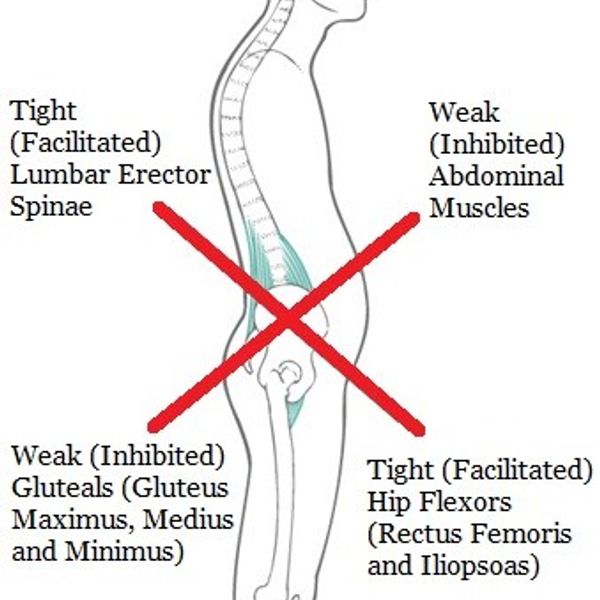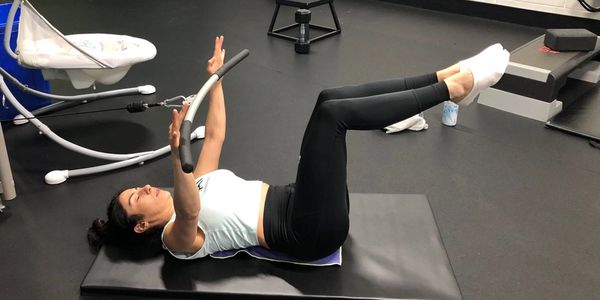NOW OFFERING: Pelvic Floor Physiotherapy, Massage therapy & manual osteopathy
CORE & PELVIC FLOOR

What really is the core?
The core is comprised of the following:
1. Pelvic floor muscles
2. Transverse abdominis
3. Internal and external obliques
4. Rectus abdominis
5. Erector spinae (group of muscles of the back)
6. Multifidus (deepest muscle along the spine)
7. Diaphragm
8. Glutes

Muscle tightness and weakness
Weakness in one muscle can cause another muscle to overcompensate and become tight. For example, tight hip flexors and lower back muscles often stem from weak deep abdominals and/or glutes. This is known as the lower body cross syndrome.

Getting to the root cause of pain
Stretching and release of tight muscles may provide relief, but is often only temporary since it is not addressing the root cause. Strengthening the weak muscles (often the deep abdominals and glutes) and restoring proper core function can provide long-term relief. We have the knowledge and experience to help you achieve this.
diastasis recti

What it is and what causes it
Diastasis recti is a separation of the rectus abdominis. It most often occurs in women during the later stages of pregnancy, but can also be present in both men and women outside of pregnancy and postpartum. When these muscle separate, the connective tissue that runs vertically between the left and right sides (linea alba) joining these muscles stretches sideways, causing it to become thinner and weaker. It is important to know that every woman gets some degree of diastasis recti by the third trimester.

How to perform a self-check for DR
- Lie on your back with your knees bent and feet flat on the floor.
- Place one hand on the midline of your core with your fingers flat on your midline.
- Tuck your chin towards your chest and slowly lift your head off the floor, adding pressure through the pads of your fingers.
- With no diastasis recti, there is the sensation of a toned midline. If you feel a space, or your fingers sink into your core, you likely have diastasis recti.
- Repeat the procedure all long the midline.

How we can help
We use corrective exercises to help remodel the fascia. Diastasis healing is not a one size fits all approach. After a thorough assessment, we will determine the best action plan for each client.
- Optimize breathing and posture.
- Learn proper core engagement techniques to apply into everyday movements.
- Establish a starting point for core exercises, and progressively increase the difficulty as milestones are reached.
pelvic organ prolapse

Receiving a diagnosis of prolapse
Hearing the word "prolapse" can be a devastating diagnosis. Especially when going down the Internet rabbit hole.
The truth is, almost every woman has some degree of laxity in their vaginal walls in the early postpartum period. This can often be categorized as prolapse, even though it is completely normal and will often heal on its own with gentle corrective exercises and breathing (and not to mention rest!).
Prolapse can also develop in women who have not given birth, or become apparent later postpartum due to a variety of reasons - including hormonal changes, repetitive straining, improper lifting and surgery. Seeing a pelvic floor physiotherapist is a great starting point.

Exercising with prolapse
It is not uncommon to be told not to lift anything over 10lbs (or another arbitrary weight) with a prolapse. Hearing this can be extremely defeating as a mom, especially with the demands of life, kids, etc.
At 2 The Core, we take a completely different approach! We need strong muscles to tackle everyday life. It's not so much how much we lift, but how we lift. It's all about pressure management and learning how to properly brace the core so as not to create excessive downward pressure on the pelvic floor. Corrective exercises can improve both the grade and symptoms of prolapse - when done properly. We will collaborate with your pelvic floor physiotherapist to help you get back to the activities you love!

How we can help you feel better
We teach our clients how to:
- Lessen the load on the pelvic floor in everyday movements
- Make adjustments to posture and breathing to optimize pelvic floor function
- Reduce tension/gripping in the upper abdominals & diaphragm
- Build stability and strength in the deep core muscles through smart exercise choices
- Relax the pelvic floor muscles (tension and over-gripping often increases symptoms of POP)
- Practice the Hypopressive Technique
other pelvic floor symptoms not to ignore

Incontinence and/or frequent urge to pee
Although pelvic floor symptoms may be embarrassing to talk about, they are more common than you might think. If you experience leakage, frequent urge to pee, inability to fully empty your bladder or bowels, having to strain to pee - you are not alone and help is easily accessible!

Painful intercourse
Painful intercourse is what originally introduced me (Christina, owner of 2 The Core) to pelvic floor health. I suffered from this for nearly one year after having my first baby in 2012. I didn't know pelvic floor physiotherapy even existed until I finally went to my doctor for guidance at nine months postpartum. I got treatment from a pelvic health physiotherapist, took a multitude of courses to learn more and implemented changes to both the way I trained myself and my clients. It became my mission to help other women who suffer from this not-so-uncommon issue!

How we can help
Kegels are often not the right approach to help with incontinence, urge to pee or dyspareunia (painful intercourse). Often, learning how to relax the pelvic floor and breathe properly is the best approach. Strengthening the glutes and deep abdominals so that the pelvic floor is not overworking to stabilize the pelvis is also key.
We love to collaborate with pelvic health physiotherapists - 0ur therapies complement each other!
2 The Core Pre & Postnatal Training Inc
6031 4 Street SE Calgary, AB. T2H 2A5 (located within yyc village)
Copyright © 2021 2 The Core Training Inc - All Rights Reserved.
